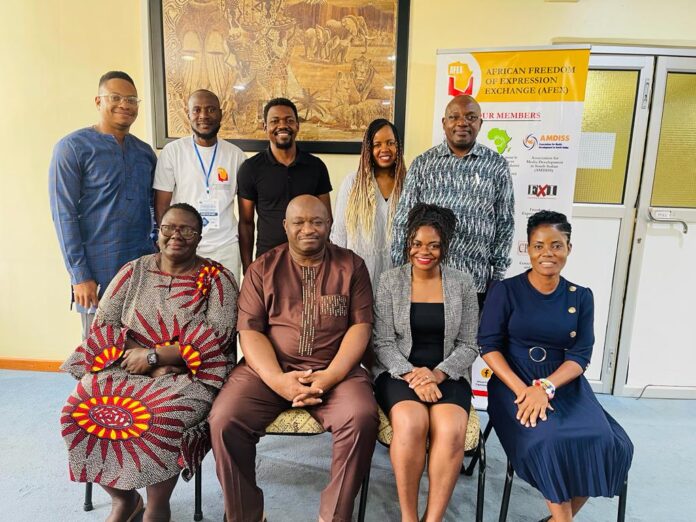The Africa Freedom Expression Exchange (AFEX), on October 19, 2023, joined stakeholders at the 77th session of the African Commission on Human and Peoples’ Rights (ACHPR) in Arusha, Tanzania. A side event was organized by AFEX and the International Press Institute (IPI) under the theme: Addressing online threats towards female journalists in Africa: Gaps and opportunities. The meeting was attended by civil society organization representatives across Africa.
This meeting was purposed to provide a platform for the coordination of advocacy efforts at national, regional and international levels on threats to female journalists, and improve on the monitoring, documentation, and reporting of online threats against them.
A reference to an article by Kenyan journalist, Caroline Kimeu, titled: ‘As Social Media Grows in Kenya, So Does Disturbing Toxic Manosphere’, which was published by The Guardian, kickstarted the meeting. In this article Caroline highlighted websites and social media platforms that promote misogyny online. However, her efforts were met with backlash which underscored the importance of ensuring the online safety of female journalists.
Speaking at the event, Rebekah Awuah, Senior Reporter of The Fourth Estate, an accountability journalism project of the Media Foundation of West Africa shared the experiences of some female journalists in Ghana who were subjected to threats of physical violence, dissemination of photoshopped images to silence the journalists, and threats to publish intimate images online. She indicated that the Media Foundation for West Africa has a project solely focused on digital rights.
Gilbert Sendungwa, Executive Director of Africa Freedom Information Center (AFIC) shared findings from recent research by AFIC on the gendered-dimensions of journalists’ safety in Kenya, Uganda and Tanzania. He revealed that the research was informed by the lack of gender-disaggregated data on the safety of journalists. The findings of the research indicated that: these three countries have legal frameworks for the promotion of press freedom and the safety of journalists including national constitutions but these mechanisms are not being utilized. Consequently, there is a need to approach the safety of journalists from a holistic point of view that includes focusing on physical, psychological, digital, and financial well-being.
The Director for Africa at World Association of News Publishers, Jane Godia, highlighted the work of WAN-INFRA to promote the safety of journalists online through engagements with newsrooms and editors to develop policies on online harassment and also provide safety and security training. She also referred to a case of a female Zimbabwean journalist who was scandalized online when she reported a case against her perpetrator for sexual harassment.
Thobekile Matimbe from Paradigm Initiative shared two tools to curb online threats – Ripoti and Ayeta. These are aimed at safeguarding digital rights, providing digital security report and providing a platform to report digital rights violations in Africa and the Global South.
Edetan Ojo from Media Rights Africa highlighted the mandate of the state to safeguard the safety of journalists even though the state is a leading perpetrator. He emphasized the need to pressure governments to uphold commitments at all levels and shared MRA’s experiences with public interest litigation to promote accountability for crimes against journalists.
Some key recommendations from the meeting included a call for efforts to improve the disaggregation of data on gender-based violence which remains critical for the advocacy of the safety of female journalists and the need to develop a methodology to monitor and document violence against female journalists.
The AFEX network is committed to engaging with stakeholders across the Africa to collaborate on policies to improve the safety of female journalists online and adopt recommendations from the meeting to enable the citizens of Africa operate in a safe digital space where their security and freedoms are protected both online and offline.




